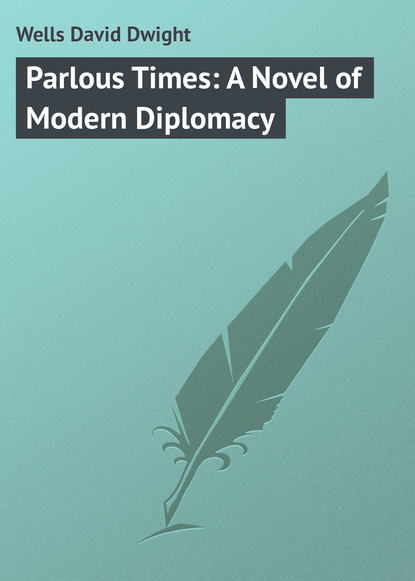По всем вопросам обращайтесь на: info@litportal.ru
(©) 2003-2024.
✖
Parlous Times: A Novel of Modern Diplomacy
Настройки чтения
Размер шрифта
Высота строк
Поля
"At least, not in the direction of diplomacy," murmured the Lieutenant, giving the waiter a directive glance towards his empty champagne glass.
"You have a beautiful country, Miss Fitzgerald," came the soft voice of Madame Darcy, who had heard the aside, and was sorry for the young girl at whom it was directed.
"Oh, Ireland, you mean. Yes, I love it."
"We are mostly Irish here," laughed Lieutenant Kingsland. "One of my ancestors carried a blackthorn, and Miss Belle Fitzgerald."
"Belle Fitzgerald!" she said, starting and looking keenly at the Irish girl, who turned towards her as her name was mentioned, "are you the Belle Fitzgerald who knows my husband, Colonel Darcy – so – well – "
"Your husband?" she said slowly, looking Madame Darcy straight in the face. "Your husband? No, I have never met your husband. I do not know him."
Lieutenant Kingsland, seeing the attention of the company diverted from his direction, half closed his eyes, and softly drew in his breath. Just then the orchestra made an hejira to the drawing-room, and the little party hastened to follow in its footsteps, in search of more music, liqueurs, coffee, cigarettes, and the most comfortable corner.
"My dear Jim," expostulated his guest of honour, half an hour later, "there is not a drop of green Chartreuse, and you know I never drink the yellow. Do be a good boy and run over to the dining-room, and persuade the steward to give us some."
As he rose and left them, obedient to the Irish girl's request, she leaned over to Kingsland, who was seated next her, and handing him a square envelope, said quietly, and in a low voice: —
"I want this given to Colonel Darcy before Stanley returns – his party is still in the dining-room. Don't let our crowd see you take it."
"Oh, I say," he expostulated, inspecting the missive which was blank and undirected, "it's a risky thing to do, especially in the face of the whopper you just told his wife about not knowing him."
"I had to, 'Dottie' – I had indeed – she's so jealous she would tear the eyes out of any woman who ventured to speak to him."
"I won't do anything for you if you call me 'Dottie.' You know I hate it."
"Well, Jack then – dear Jack – do it to please me and don't stand there talking, Stanley may return any minute."
"All right, I'll go."
"And don't flourish that envelope, it's most important and – it's too late."
"The Chartreuse is coming," broke in the Secretary. "I met the steward in the hall – a letter to be posted?" he continued, seeing the missive, which the Lieutenant held blankly in his hand. "Give it to me, and I'll attend to it."
A sharper man might have saved the situation, but sharpness was not one of Kingsland's attributes, and dazed by the sudden turn of affairs, he allowed Stanley to take the letter.
"Why, it's not addressed!" he exclaimed, examining the envelope which bore no mark save the initials A. R. in blue, on the flap. "Whom is it to go to?"
"I don't know," replied the Lieutenant, shamefacedly.
"Where did it come from?"
Kingsland looked about for help or an inspiration, and finding neither fell back on the same form of words, repeating, "I don't know."
Miss Fitzgerald had started up on the impulse of the moment, but sank back in her seat as the Secretary said, slipping the missive into the inside pocket of his dress-coat: —
"I am afraid I must constitute myself a dead-letter office, and hold this mysterious document till called for."
CHAPTER III
PARLOUS TIMES
"We are living in parlous times," said the Chief Confidential Clerk, of the Departmental Head of the South American Section of Her Majesty's Foreign Office.
Mr. Stanley, Secretary of South American Legation, bowed and said nothing. Inwardly, he wondered just what "parlous" meant, and made a mental note to look it up in a dictionary on the first opportunity that offered.
The Chief Confidential Clerk was the most genial of men, who always impressed one with the feeling that, diplomatic as he might be at all other times, this was the particular moment when he would relax his vigilance and unburden his official heart. As a result, those who came to unearth his secrets generally ended by telling him theirs.
In this instance neither of the speakers knew anything of the subject in hand, a treaty relating to the possession of a sand bar at the mouth of a certain South American river. A matter said to have had its rise in a fit of royal indigestion, in the sixteenth century. Somehow it had never been settled. Each new ministry, each new revolutionary government was "bound to see it through," and the treaty was constantly on the verge of being "brought to an amicable conclusion," just as it had been for nearly three hundred years.
The fate of nations had, in short, drifted on that sand-bar and stuck fast, at least the fate of one nation and the clemency of another.
The Chief Confidential Clerk was not conscious that he was really ignorant of the subject in hand – no true diplomat ever is – the young Secretary was painfully aware of his own unenlightenment.
"You are to understand," his Minister had said, "that you know nothing concerning the status of the Treaty."
"But, I do not know anything, Your Excellency," admitted the Secretary.
"So much the better," replied the Minister, "for then you cannot talk about it."
The result of this state of affairs was, that at the end of half an hour the Chief Confidential Clerk had discovered that the Secretary knew nothing, while the Secretary had discovered – nothing.
"We are living in parlous times," said the English official, "parlous times, Mr. Stanley."
Then his lunch arrived, and the interview closed in consequence.
"I wonder," said the Secretary, half to himself and half to the horse, as he trundled clubwards in a hansom, "I wonder if I could write out a report of that last remark; it might mean so much – or so little."
Stanley did not worry much over his failure to extract information at the Foreign Office, because he was much more worried over deciding whether he was really in love with Belle Fitzgerald.
That young lady had been the cause of much anxiety to all those friends who had his interests at heart, and from whom he had received advice and covert suggestions, all tending to uphold the joys of a bachelor existence as compared with the uncertainties of married life. They had spoken with no uncertain voice. It was he who had wavered, to-day, believing that she was the one woman on earth for him; to-morrow, sure that it was merely infatuation. Now his decision had been forced. He was invited to a house-party at her aunt's, Mrs. Roberts; Belle would be there, and if he accepted, he would, in all probability, never leave Roberts' Hall a free man.
Miss Fitzgerald and the Secretary had seen a great deal of each other during the season just drawing to a close. At first, as he assured himself and his friends, it was merely "hail, fellow, well met," but when he came to know the Irish girl better, their relations assumed a different significance, as he gradually realised the isolated position she occupied. Interest had changed to pity. He regretted that, for lack of guidance, she seemed to be her own worst enemy, and feared that her really sweet nature might be hardened or embittered from contact with the world. He told himself he must decide at once whether he loved this wilful girl, and should ask her to give him the right to protect her from the world and from herself.
Yet Stanley was keenly sensitive of the rashness of the step he contemplated. The sweet bells of memory ring out whether land or sea separates us. In spite of much honest effort on his part, the picture of a beautiful face could not be banished from his mind. Now, just when he was convincing himself that he could put the past behind him, Inez crossed his path again.
He grew bitter at the thought. "She did not trust me. She never loved me or she could not have married that scoundrel, Darcy. It is all over now – and Belle needs a protector."
On the other hand, he realised how many reasons opposed such a course of action. His father, his colleagues, and society, demanded something better of him. That very social position which had put him in the way of meeting his inamorata required of him in return that he should not make a mesalliance, while sober common sense assured him with an irritating persistence that the world could not be persuaded to perceive that Miss Fitzgerald had any of the necessary qualifications for the position which he proposed to give her. But he was young and high-spirited, and these very limitations which society imposed, irritated him into a desire to do something rash. He was still, however, possessed of a substratum of worldly wisdom, and knowing that left to his own devices he would certainly go to Mrs. Roberts', regardless of what might follow, he resolved to give himself one more chance. If he could not guide himself, he might, in this crisis, be guided by the stronger will of another. He determined to ask advice of his friend Kent-Lauriston.
In a case of this sort, Lionel Kent-Lauriston was thoroughly in his element, having assisted at hundreds of the little comedies and tragedies of life, which do more to determine the future of men and women than any great crisis.
His creed may be summed up in the fact that he loved all things to be done "decently and in order." In a word he was a connoisseur of life, and the good things thereof. Unobtrusive, always harmonious, he knew everyone worth knowing, went everywhere worth going. Lucky the youth who had him for his guide, philosopher and friend. He could show him life's pleasantest paths.
Stanley was one of these favoured few. They had met soon after he came to England, and the younger man had conceived a genuine admiration for the older.
It seems hardly necessary to say, that Kent-Lauriston, though (or because) a bachelor, was an authority on matchmaking. He had reduced it to a fine art. His keen eye saw the subtle distinction between the vulgar buying and selling of a woman, with the consequent desecration of the marriage service, and the blind love, which, hot-headed, sacrifices all the considerations of wisdom to the passion of the hour.
"Never marry without love," he would say, "but learn to love wisely."







